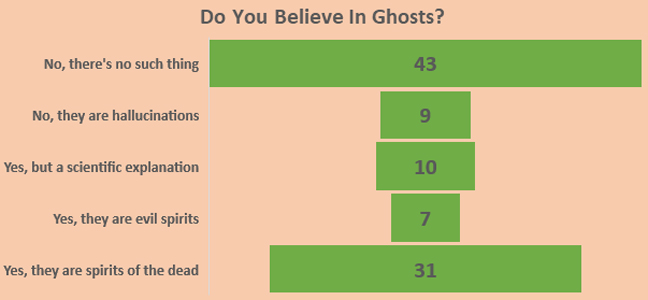Belief in Ghosts
Do Children Believe In Ghosts?

Belief in ghosts has been a part of human culture since prehistoric times. Ancient religions believed that the spirits of the dead lived on and one of the main purposes of funerals was to prevent these spirits from returning to Earth and bothering the living.
In the modern age belief in ghosts is no longer taken for granted. There is no scientific proof of their existence but, just as with other supernatural entities such as gods or fairies, it is impossible to prove something does not exist. You can only prove things that do.
We wondered what children’s attitudes to ghosts were. Do they discount them as myths from a bygone era, or are they more open minded and willing to believe in non-corporeal spirits? So, we decided to find out.
For our latest survey we asked a total of 2,458 children the following question: “Do you believe in ghosts?” We gave a choice of answers: No, there's no such thing, No, they are hallucinations, Yes, but there is a scientific explanation, Yes, they are evil spirits, and Yes, they are spirits of the dead.
This is what we found:
- Almost half of our respondents (43%) said “No, there's no such thing”
- 9% believe that sightings of ghosts can be explained away as hallucinations
- 10% think the phenomenon is real, but there will in time be a scientific explanation
- 7% believe that ghosts are evil spirits
- 31% take the traditional view that ghosts are the spirits of the dead
As you can see, the results are not conclusive. 52% believe there are no such things as ghosts, while 48% think there are. That’s about as close a result as you can get, as we all remember from some vote or other that took place back in 2016.
Ghosts in Folklore
The living have long feared being visited by the returning spirits of the dead. That is where we get legends such as vampires from. Spirits have also been associated with places, often haunting the sites of their deaths, or the places they dwelt in life.
This is not confined to European cultures by any means. Chinese philosopher Confucius said, “Respect ghosts and gods, but keep away from them.” And a poll conducted in 2005 found that a third of Americans believe in ghosts. While in Mexico, belief in ghosts is common. It is even celebrated in the annual “Day of the Dead” festival.
Ghosts in Religion
The Bible mentions ghosts many times. Usually these are consulted by mediums, and this is frowned upon as witchcraft. In the New Testament Jesus’ disciples mistake him for a ghost after his resurrection. They make the same mistake when they see him walking on water, which we can take as evidence that the early Christians believed in ghosts.
Islam also accepts that ghosts are real. Traditionally there are many gateways to the other world which the spirits of the dead can use to travel. Similarly to the ancient religions, improper burials in Islam can lead to the spirt of the deceased becoming trapped in this world.
Ghosts are an integral part of Buddhism. One of the many destinations the dead are reborn into is “the realm of hungry ghosts.” The residents of this place visit Earth to be fed. If they are, then they will rest but if not then they will cause trouble for the living. They are celebrated annually in the “Ghost Festival.”
Scientific View
Before the 18th Century, almost everybody believed in ghosts. It was not until the enlightenment that people started to question and to use science to investigate the phenomenon. The first sceptical findings were in 1813 when John Ferriar put the appearances of ghosts down to optical illusions. Other explanations put forward include hallucinations, dreams, sleepwalking, madness and even magnetism.
Joe Nickell was also sceptical after his investigations into ghosts. He believed that our senses and our minds try to find explanations for events with unknown causes. For example, a change in air pressure can cause doors to slam, or humidity floorboards to creak. There is nothing paranormal about these events, only the explanations we make for them.
There have been many, many studies into ghosts since then. Sadly, not one of them has been able to find any evidence supporting the existence of ghosts. When you consider the amount of time and resources spent trying to find proof of ghosts, then the fact that none has been forthcoming does rather support the idea that ghosts do not exist.
More Survey ResultsFull Results of our " Do you believe in ghosts?” Survey
Here are the results from 2,458 children who answered our question "Do you believe in ghosts?". The survey was conducted in the week ending November 29th, 2020.
| Do you believe in ghosts? | Percentage of Respondents |
|---|---|
| No, there's no such thing | 43% |
| No, they are hallucinations | 9% |
| Yes, but there is a scientific explanation | 10% |
| Yes, they are evil spirits | 7% |
| Yes, they are spirits of the dead | 31% |



